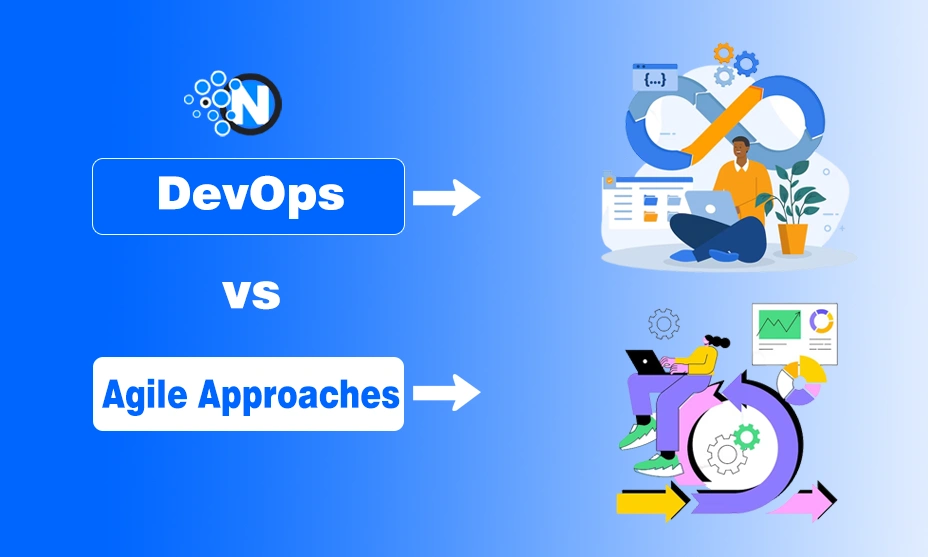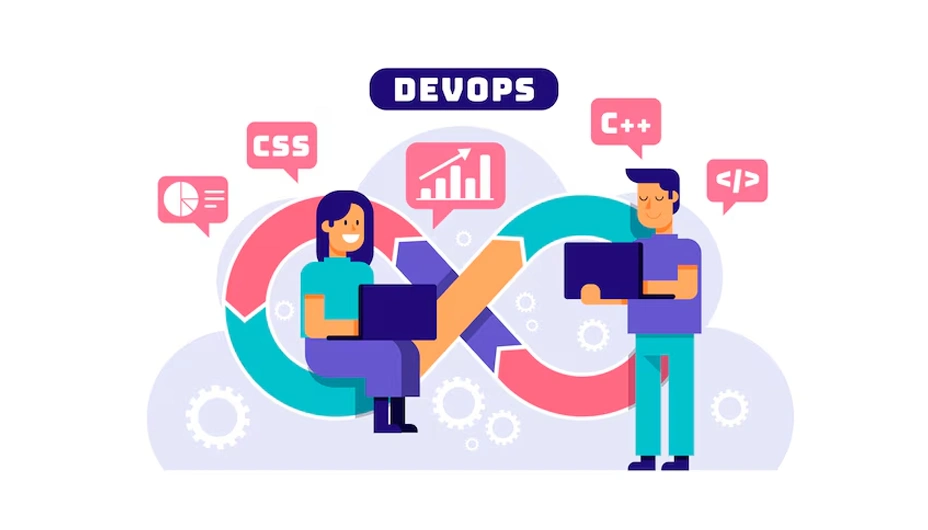Practical Insights into DevOps vs Agile Approaches

Technological advancements have provided enormous strategies to overcome the critical challenges of software development. However, two methods, DevOps vs Agile, have gained massive importance because they can easily streamline different hectic development processes.
Although they differ in several aspects from each other, the outcomes are usually similar. In this blog post, we will elaborate on the principles, benefits, and practices of both approaches.
What is DevOps?
DevOps is a comprehensive set of practices and solutions that integrates complete development (Dev) and operations (Ops) to enhance the software development lifecycle.
Moreover, this approach helps streamline different procedures from code creation to deployment by leveraging high-end tools and software.

Principles
DevOps guarantees perfect cooperation between development processes and IT operations by bridging their distance. Reducing lead time enables businesses to increase general efficiency and speed software rollout.
In this way, it ensures that both these functionalities go side by side and promote collaboration between them. It automates several labor-intensive activities, allowing businesses to create and market completely working software solutions quickly.
Practices
DevOps incorporates several key practices, like:
- Infrastructure as Code (IaC): Code-based infrastructure management guarantees scalability and consistency.
- Continuous Integration, Delivery, and Deployment: Ensures smooth updates and faster releases.
- Automation: Utilizes tools like Jenkins, Docker, and Kubernetes to streamline integration and deployment.
Benefits
DevOps focuses more on breaking down the barriers between development and operations. Hence, it ensures reliable and faster delivery.
- Removes obstacles between operations and development so guaranteeing dependable and quicker software delivery.
- Improves process efficiency by means of automation, therefore lowering hand mistakes.
- Uses a constant feedback loop to let developers spot and fix problems fast.
- Increases general efficiency, hence producing better software and more team cooperation.
What is Agile Methodology?
Agile methodology is full of perks and efficiency as it enables software developers to cut down the larger procedures into smaller ones to work more effectively on every segment.

Principle of Agile
Talking about the principle of Agile methodology is founded on the Agile Manifesto that focuses more on flexibility, collaboration, and customer satisfaction.
Additionally, it prioritizes individuals and their interactions. Along with it, it mainly covers the entire working solutions and customer collaboration over different processes and tools.
Practices Used in Agile
Agile methodologies are of various types. However, two of them, Scrum and Kanban, and widely practiced in this modern landscape.
- Scrum: Involves a comprehensive development cycle divided into smaller pieces known as sprints.
- Kanban: Primarily focuses on continuous delivery by visualizing work using a Kanban board.
Benefits
The agile approaches enable the developers concentrate on adaptability and customer-centric development by breaking the intricate software development process into smaller parts.
- Lowers time-to-market, so enabling businesses to rapidly expand their user base.
- Improves adaptability by dissecting difficult development processes into smaller pieces.
- Encourages customer-centric development by enabling fast answers to evolving needs.
- Enhances team cooperation and helps to create a more effective workflow.
Complementary Aspects of DevOps Vs Agile
DevOps vs Agile methodologies have their own specific potential to streamline software development procedures.
However, when they are synchronized with each other, they can have incredible complementary outcomes. In the under-section, we have elaborated on some of them.
1 – Collaboration
We have detailed in the previous sections that agile methodologies help in bringing and enhancing collaboration between development teams. DevOps further extends this collaboration to the operations.
The cooperation of both these technologies helps companies to develop, deploy, and maintain the software product simultaneously to ensure its operational tendency,
2 – Continuous Improvement
Both Agile vs DevOps approaches focus on continuous improvement to enhance the functionalities of software.
- Agile: Focuses on iterative enhancements at each sprint level to adapt to modern demands.
- DevOps: Uses automation to streamline the process and generates a whole innovative and efficient strategy.
3 – Automation
Automation is another common characteristic of these high-end software development approaches.
- Agile: Primarily uses automation for testing and integration.
- DevOps: Automates the whole delivery process for faster, more reliable development and operations.
Challenges and Considerations
The businesses and industries see the following to be the major difficulties and factors of importance. They need to be handled aggressively if one wants all the intended results.
1 – Organizational Culture
Adopting Agile and DevOps will result in a significant transition in your company’s traditional organizational culture. It can generate contrast and lead to less team cooperation, therefore compromising the functionality of the teams.
Moreover, a rigid organizational structure can make it challenging to implement these strategies, preventing you from getting the perks of these high-end approaches.
2 – Tooling and Integration
The effective implementation of Agile and DevOps technologies involves using a variety of tools, including integration and automation solutions. It is crucial to ensure that the integrated tools work properly with both methodologies.
Otherwise, compatibility and interoperability can be the most significant challenges, affecting the overall performance and growth.
3 – Skillset and Training
Following the Agile and DevOps practice requires a complete skill set. Therefore, teams need a proper training session to understand the functionalities of these technologies and implement them successfully. Mastering the development, testing, and operational skills is extremely important for success.
Final Verdicts
Based on the benefits and principles, it is really tough for a software development company to choose between the Agile and DevOps strategy. Both methodologies possess immense potential to help you overcome the challenges in the development and testing procedures.
You thus can choose anyone. Still, using them both at once would be more advantageous since it will provide fresh opportunities for success by improving customer-centric development, adaptability, and teamwork. The partnership of both these approaches will guarantee automation, teamwork, and ongoing delivery.




